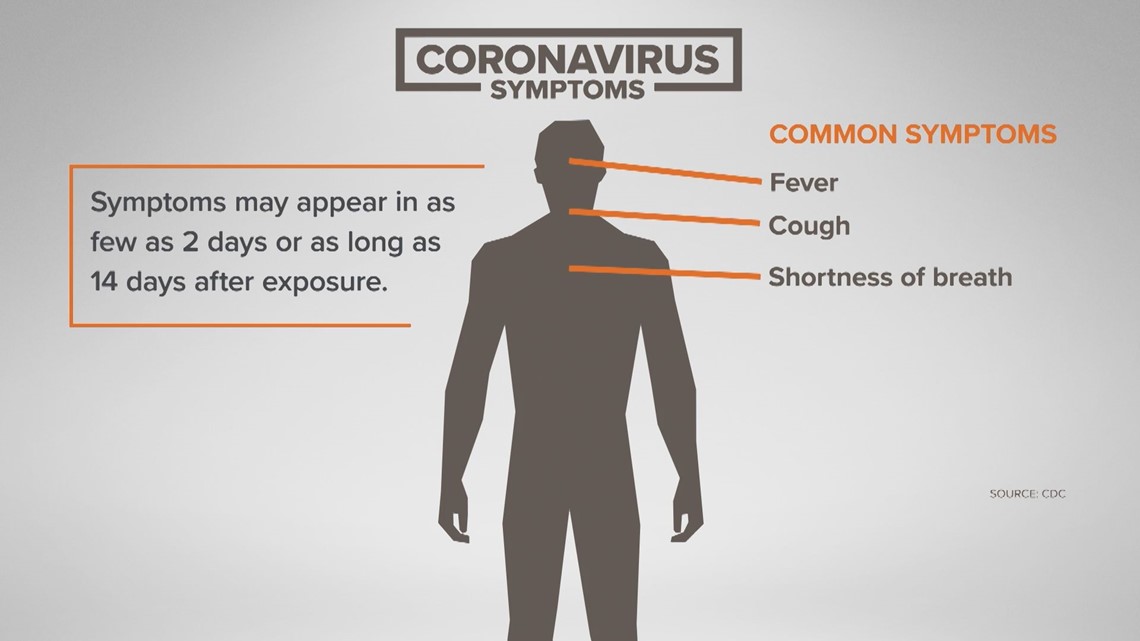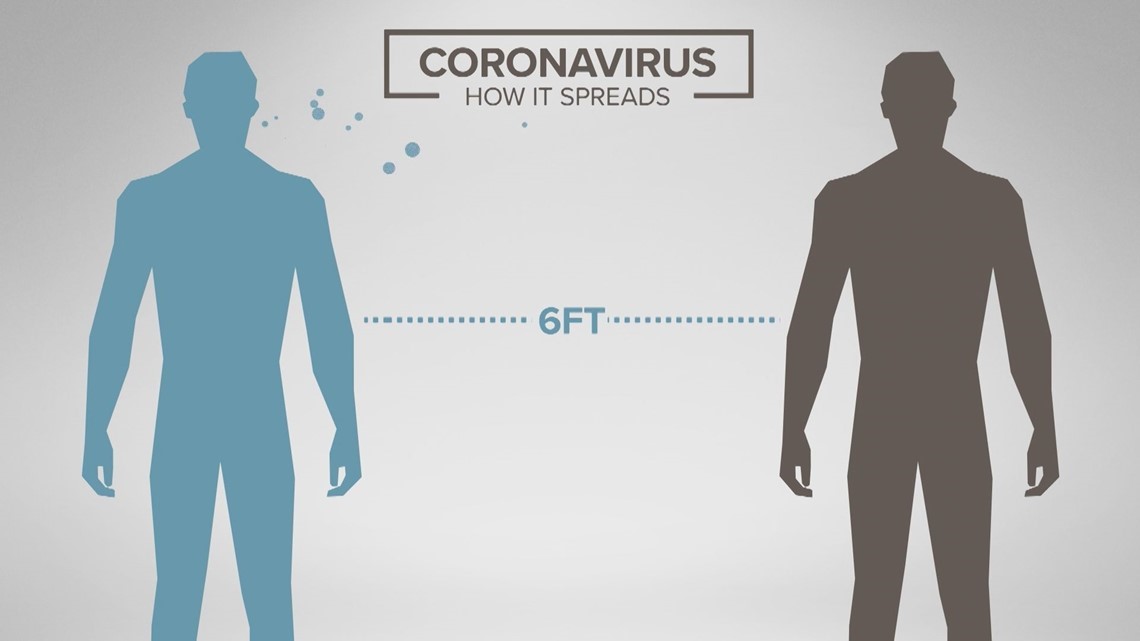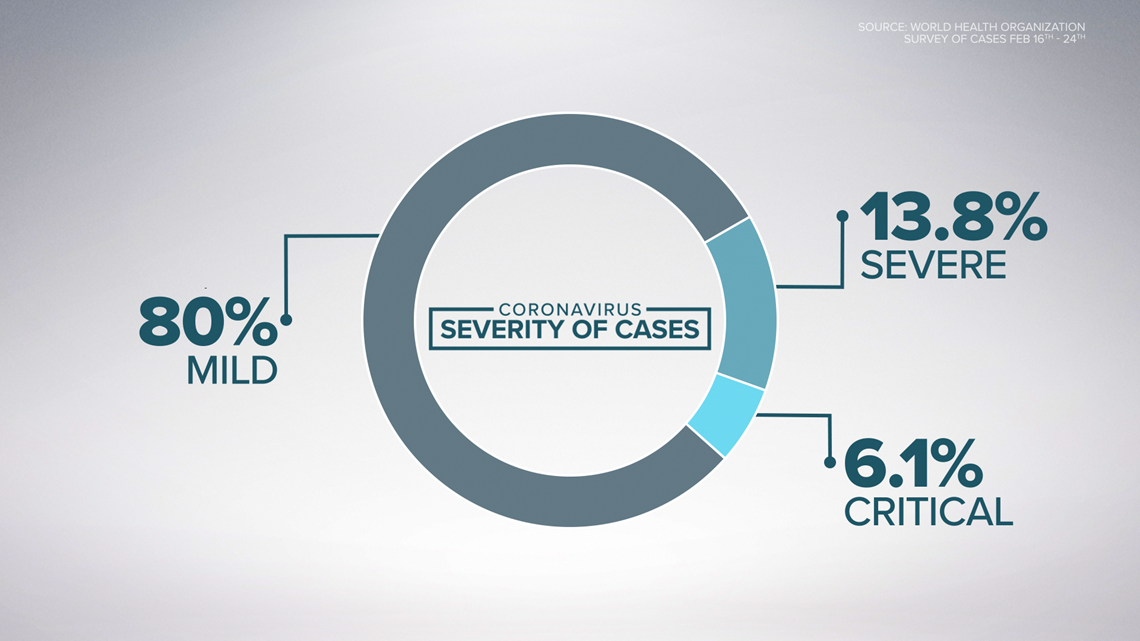IS COVID-19 IN TENNESSEE?
As of March 14, 2020, the Tennessee Department of Health reported 32 confirmed cases of COVID-19 coronavirus in the state.
The health department maintains a regularly updated web page where it lists the number of confirmed cases. It also has links to additional facts and resources about COVID-19.
Gov. Bill Lee also formed a task force to handle the virus. The task force will develop precautionary measures and emergency response plans.
WHICH COUNTRIES/STATES HAVE CASES?
COVID-19 coronavirus cases have been reported in countries around the world, including the United States.
A project from the Johns Hopkins Center for Systems Science and Engineering lets you track COVID-19 cases around the world using an interactive map. The map is best viewed on a desktop. Click here for a larger view from Johns Hopkins University.
HERE ARE THE SYMPTOMS OF COVID-19
According to the Centers for Disease Control, patients have reported a mild to severe respiratory illness, with symptoms of cough, fever, and shortness of breath.
The CDC said those symptoms can appear within two days, or as long as 14 days after exposure.


FACT CHECK: March 2, 2020 - Fact-checking coronavirus claims on severity, fatalities, hand sanitizers and more
HOW DOES THE VIRUS SPREAD?
The CDC said the COVID-19 coronavirus is believed to spread mainly from person-to-person, particularly between people in close contact with one another (within about 6 feet) through respiratory droplets produced by coughing or sneezing. The CDC said those droplets can be inhaled or end up in the mouths or noses of people who are nearby.


The CDC added that people infected with COVID-19 are thought to be most contagious when they are most symptomatic (or in other words, when they are the sickest).
"Some spread might be possible before people show symptoms; there have been reports of this occurring with this new coronavirus, but this is not thought to be the main way the virus spreads," the CDC said on its website.
"It may be possible that a person can get COVID-19 by touching a surface or object that has the virus on it and then touching their own mouth, nose, or possibly their eyes, but this is not thought to be the main way the virus spreads," the CDC said.
RELATED: VERIFY: Hand sanitizer can protect against coronavirus, but not as well as washing your hands
MASKS ARE ONLY FOR PEOPLE WHO ARE ALREADY SICK
The Surgeon General of the United States published a strongly worded tweet telling people to "STOP BUYING MASKS!"
According to the Centers for Disease Control, masks are not effective for someone who's healthy, and won't protect them from catching respiratory diseases, including COVID-19 coronavirus.
Face masks are recommended for people who are showing symptoms, because they can help prevent the spread of disease from them to others. Face masks are also considered crucial for health care workers and caregivers.
HOW DO DOCTORS TEST FOR COVID-19?
According to CDC guidance for health professionals published in mid-February, doctors are advised to do a swab of a patient's nose and throat, as well as collecting a sputum sample. The sample is then sent for lab testing.
HOW SEVERE IS THE ILLNESS?
Numbers from the World Health Organization showed a survey of COVID-19patients from Feb. 16-24 showed mild symptoms in 80% of cases, with severe illness reported in 13.8% of cases, and critical illness in 6.1% of cases.


HERE'S WHAT YOU CAN DO TO PREVENT SPREADING THE VIRUS
The CDC recommended these everyday lifestyle tips for avoiding the spread of any type of respiratory virus:
• Avoid close contact with people who are sick.
• Avoid touching your eyes, nose, and mouth with unwashed hands.
• Wash your hands often with soap and water for at least 20 seconds. Use an alcohol-based hand sanitizer that contains at least 60% alcohol if soap and water are not available.
• Clean and disinfect frequently touched objects and surfaces using a regular household cleaning spray or wipe.
DISINFECTANTS: EPA issues list of disinfectants to use against coronavirus
HERE'S WHAT YOU CAN DO IF YOU ARE SICK
The CDC said to take these steps to avoid spreading a respiratory illness:
• Stay home when you are sick, except to get medical care.
• Call ahead before visiting your doctor, so the office can take steps to keep other people from being exposed.
• Separate yourself from other people and animals in your home.
• Cover your cough or sneeze with a tissue, then throw the tissue in the trash.
• Clean and disinfect frequently touched objects and surfaces.
• Avoid sharing personal household items like cups, towels or bedding.
RELATED: Worried about a shortage of hand sanitizer due to Coronavirus fears? Here's how to make your own
HERE'S WHAT YOU CAN DO TO PREPARE
Infectious disease specialist Dr. Michael Osterholm said it's a good idea to stock up on essential medication, supplies and non-perishable food, but he said the first thing everyone should do is talk to your loved ones and make a plan.
"What are they going to do if they get ill? Who will they call? How will they access the medical care system? Who is watching out for grandma?" Osterholm said. "We need, right now, to really develop communication plans so that we're checking on people every day.
The CDC also recommended creating a household plan of action as part of your preparations:
• Meet with household members, relatives, and even neighbors about emergency planning.
• Plan ways to care for those who might be at greater risk.
• Create an emergency contact list.
• Practice good personal health habits.
• Choose a room in your home that can be used to separate someone who is sick from those who are healthy.
• Learn the emergency plans for your child's school or daycare.
• Learn about your employer's emergency operations plan.
WHAT ABOUT PETS?
The CDC says anyone sick with COVID-19 coronavirus should restrict contact around pets just like people.
"Although there have not been reports of pets or other animals becoming sick with COVID-19, it is still recommended that people sick with COVID-19 limit contact with animals until more information is known about the virus," the CDC said.
Researchers in Hong Kong recently reported that cats and dogs can't pass the virus to humans, but they can test positive for low levels of the pathogen if they catch it from their owner.
STAY INFORMED
The Centers for Disease Control has an in-depth frequently asked questions (FAQ) section on its website with additional answers for people looking for more information about COVID-19 coronavirus.
MORE TOP QUESTIONS: Coronavirus: Answering the top 10 questions people have been Googling

